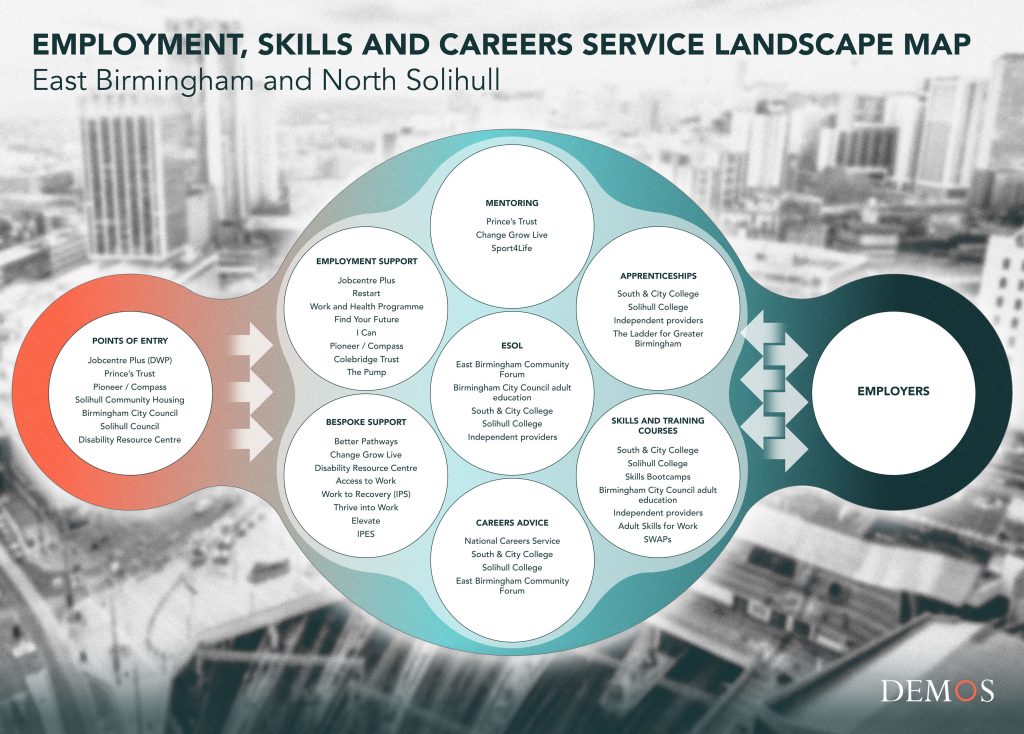
More than devolution alone is needed to join up local services
In recent years, devolution in England has become a cross-party political agenda. The government has concluded ‘trailblazer’ devolution deals with the Greater Manchester and West Midlands Combined Authorities (WMCA), and new devolution deals in areas including York and North Yorkshire and the East Midlands. Meanwhile Keir Starmer has stated that the Labour party, under the heading of its ‘Take Back Control bill’, would deliver “a huge power shift out of Westminster” under a Labour government.
For public services, devolution has two potential advantages. The first is adapting services to suit the local context, and the second is joining up local services (also often referred to as integration or co-ordination). Both can improve outcomes for citizens.
In newly published research, the cross-party think tank Demos, in partnership with Birmingham City Council, examined the landscape of employment, skills and careers services in the area of East Birmingham and North Solihull – a relatively deprived area with high unemployment, identified as a ‘Levelling Up Zone’ in the trailblazer devolution deal, and an area of strategic focus for Birmingham City Council. Some wards in East Birmingham have unemployment rates of 14%, so there is significant need for these ‘labour market services’. For our research, we spoke to local stakeholders including service providers, Combined and Local Authority officers and civil servants.
Our report, A Tapestry of Services, shows that while devolution in its current form may be sufficient to achieve local adaptation, much more is needed to enable joining up local services.
In the report we provide a non-exhaustive list of over 50 different employment, skills and careers programmes or services in operation in the local area. We found that the complexity of the service landscape makes it hard for citizens to navigate, with service providers pointing to a lack of awareness about what was available.
Service providers do important work to facilitate communication and partnerships between organisations, but often do so despite the structures they work within, rather than being enabled by them. The ‘service landscape map’ we developed based on our research illustrates this complexity:

To give specific examples, there is some local adaptation in the area. The Adult Education Budget is devolved to the WMCA; Birmingham City Council and Solihull Metropolitan Borough Council have some flexibility over how to use the UK Shared Prosperity Fund; and the National Careers Services is partly subcontracted to the East Birmingham Community Forum.
But this doesn’t necessarily lead to joined up services. For example, some service providers told us they couldn’t make referrals to other organisations to help people, because of funding rules. Other providers explained to us that, in effect, each organisation does its own separate promotion/marketing to employers, despite being similar to each other (offering help to fill vacancies or upskill employees) – which can be frustrating for employers.
However, according to many of the interviewees to whom we spoke, stakeholders are keen to find ways to join up local services. In our research, we focused on one particular case study as an example: the ‘I Can’ programme which operates across the Birmingham and Solihull Integrated Care System geography. This programme is designed to help people access entry-level employment in the NHS, particularly those from more disadvantaged areas. It is an excellent example of partnership working between multiple organisations, who together have created an integrated ‘pathway’ for users – from initial interest, through to providing people with easy-to-understand information, to pre-employment training and support to fill in a formal NHS job application. It’s a great example of joining up local services across employment support and skills to improve outcomes – and fill NHS vacancies at the same time.
More joined up services, using the model of ‘pathway’ working in the I Can programme, offer the opportunity to boost employment and improve outcomes in this economically deprived area.
What needs to change to enable local leaders and service providers to join up services? Here are three areas to focus on.
First, our interviewees were clear that funding is a common root cause of fragmented local services. A large number of separate funding streams leads to a large number of separate services, each with their own separate priorities and ways of working. The ‘single settlement’ budget for the WMCA announced in the trailblazer devolution deal could represent real improvement on the current situation, although the details will be crucial in influencing what happens in practice on the ground.
Second, giving more flexibility to civil servants and commissioners at Combined Authorities and Local Authorities, within what already exists, could enable more joined up services. For example, Jobcentres already work fairly well with other local organisations, but there is clear potential to join up services better – and this could be enabled by granting more local flexibility, and loosening some of the current restrictions. Enabling data sharing between organisations is also crucial, as recognised in the trailblazer devolution deal.
Third, central government departments can help by aiming to reduce policy churn in employment, skills and careers services. None of the interviewees we spoke to called for new programmes or new services. But they did cite problems caused by constant change and short-term funding. Local service providers need some time and capacity to think about how to join up services – reducing the speed of change and providing medium-term funding would certainly help.
The devolution conversation needs to move on from discussing the devolution of this or that individual funding stream, to a greater focus on giving power to local areas to join up services on the ground. And integrating these labour market services shouldn’t be seen as an optional extra – it’s essential for boosting employment, improving people’s skills and filling business vacancies to contribute to inclusive economic growth.
To read more articles like this, and for regular updates on our latest research, events and political hot takes, sign up to our weekly newsletter.
